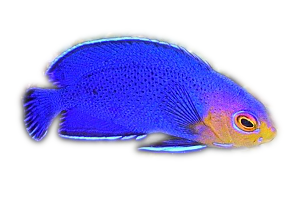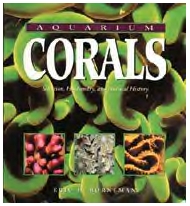
By Bob Goemans

TITLE: Aquarium Corals, Selection, Husbandry, and Natural History
AUTHOR: Eric H. Borneman
PUBLISHER: Microcosm/T.F.H. (2001)
ISBN 1-890087-47-5
PAGES: 464
PRICE: $54.95 (Hardcover) $44.95 (Softcover)

There are many books to choose from, with some written more for the novice or those wanting more scientific data. Some are short on facts and heavy on pretty pictures. Others are simply boring and lack the combination of easy to understand facts and the needed associated photography. When I first picked up Aquarium Corals, Selection, Husbandry, and Natural History I was amazed at its sweeping yet practical subject matter. As I thumbed through its pages all I could think of were the words, 'finally a book that will truly benefit all that read it.' Of course its not possible to please everyone, but I'm willing to say there will be very few who don't think this is a book well-worth owning!
With over 700 color photographs, discussion on the natural history of corals, coral husbandry, diseases, predators, reef ecology, conservation, and over 780 described genera and species including stony and soft corals, zoanthids, corallimorpharians, gorgonians, fire and lace corals, this outstanding reference source is a must for your library. If that were not enough the quality of photographs we have grown accustom to from Microcosm and the excellent literary text associated with TFH publications has been brought together in Eric's outstanding work. It's truly a win-win situation for all!
Following a brief 'Foreword,' written by Dr. J.E.N. Veron, 'Acknowledgments' pays tribute to those who have helped Eric write and publish this excellent reference work. A short 'Introduction' follows where Eric notes his past and present passion for the hobby along with his open-minded, yet elegant philosophy. A philosophy that I totally agree with as there are many methods that breed success and that there should be a willingness to become better educated. Only by knowing the true needs of the animals will closed systems experience long-term success.
There are twelve chapters, with Chapter 1 'Reef Worlds' discussing biodiversity, fossil records, species diversity, types of coral reefs, distribution of corals, the distinct reef zones, and the nearby communities such as mangrove swamps, estuaries, seagrass beds, and lagoons. Chapter 1 sets the stage for a much closer look at the animals that build reefs.
Chapter 2 'Anatomy Lessons' fulfills that with a close look at the coral polyp, various growth forms, colony forms, skeletal material and coloration.
Chapter 3 'Zooxanthellae' is a complete dissertation on the subject and it seems everything known about this symbiotic algae is discussed. Probably the best discussion on the subject matter that I've ever seen!
Chapter 4 'Foods & Feeding' covers what corals eat, when they eat, how they eat, what eats what and goes into how they handle seasonal changes when it comes to the abundance or scarcity of foodstuffs. Even their excretions are discussed, which is something I've not seen discussed before in such a comprehensive manner. Even the feeding of corals in home aquaria and the value of refugia are reviewed.
Chapter 5 'Secret Lives' is another chapter that by itself would be worth the price of the book. Chemical competition, morphological competition, coral toxicity to fishes, chemoreception, reproduction (asexual and sexual) and growth is detailed.
Chapter 6 'Taxonomy' consists of only 5 pages yet endeavors to simplify the biological classification system for all living things. It provides another tool in becoming better educated.
Chapter 7 'The Corals' is massive and incorporates the families, genera and species that interest most aquarists. Fire and lace corals, soft corals, stoloniferans, gorgonians, sea pens, colonial anemones, button polyps, mushrooms, and stony corals are not only individually described, each is accompanied by truly excellent color photographs. Again, another chapter worth the price of the book.
Chapter 8 'Husbandry' elaborates on Eric's open-minded philosophy that many reef keeping methods prove successful. More natural methods such as the Berlin and Jaubert methods are briefly discussed along with the Algal Turf Scrubber. Lighting and water movement is also discussed.
Chapter 9 'Water Chemistry' concentrates on the more important water parameters, e.g., ammonia, nitrite, nitrate, phosphate, pH, alkalinity, temperature, salinity, dissolved organic matter, calcium, along with minor and trace elements. Also discussed is calcification and skeletal growth.
Chapter 10 'Care & Handling' goes into coral selection, introducing and placing new corals in the aquarium, suggestions on where to place certain corals, captive-bred corals and the unexpected mortality of some corals.
Chapter 11 'Coral Health' is another chapter that sets this work apart from many other very good books on the current market. In a very understandable way it goes into recognizing, preventing, and treating diseases along with worrisome conditions and pests that show up in the aquarium from time-to-time. It even presents a list of what is called 'false alarms,' which you'll find quite helpful. The use of various treatments such as freshwater dips, Lugol's dips, coral surgery, certain antibiotics, UV sterilizers and ozone are especially valuable. The portion on predators and parasites such as unwanted anemones, crustaceans, crabs, and worms is also helpful.
Chapter 12 'Conservation' provides Eric a platform to expound on the current problems facing the marine aquarium hobby along with where we can help ourselves overcome bad press, some deserving in my opinion yet mostly from some overzealous environmentalists and misinformed politicians. The work closes with a list of 'Contacts' that includes Eric' home e-mail address, a Glossary, References, Photography Credits, Special Thanks, and Index.
In conclusion, Aquarium Corals, Selection, Husbandry, and Natural History is a well-written, informative, beautifully illustrated publication. If reef keeping is your passion or there's a reef aquarium in your future you should own this book. Even if keeping corals is not your current passion, Eric's work makes it evident that with what has already been learned by caring and passionate aquarists the successful keeping of various invertebrate is quite achievable. Moreover, Mother Nature can be assured the wild will be a better place because an educational hobby such as reef keeping is expanding our knowledge base.